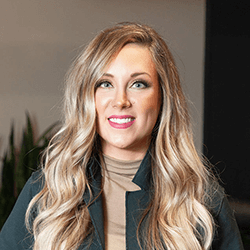Video Transcript
It's very important that while you're being a genuine, trusted adviser, you ask questions from a childlike curiosity. You're not asking questions like, "Tell me more about how much budget you have so I can utilize it." You should be asking questions like, "Tell me more about your pain so that I can use it against you."
What we teach are not weapons. They're tools. Counterintuitively, a lot of what we teach at Lushin is how not to be a salesperson. If you think about the way that your family and friends were to describe the word salesperson, it would probably sound a lot like slimy, disingenuous, commission, pushy, aggressive, and those aren't things that anyone ever wants to be.
So when people ask me, "Emily, how do I not be sales-y?" I just tell them you have to think about your prospect. It seems obvious, but a lot of times in sales, we get hung up on "How am I going to do this?" or "How much money am I going to make?" or "What's going to happen at the end?"or "Will I get this sale?"or "What if I fail?"or "How am I going to approach the next situation?"
Just leave it all behind. All you need to ask yourself is, "Can I help this person?" and "How am I going to help this person?" and "What do I need to listen for to help this person?"
You approach them with childlike curiosity—think about a special kid in your life. When they talk to you, their curiosity—how it comes across to you—is genuine. It's "Why does this work the way that it does?" or "How does this happen?" It's not because they have a hidden agenda that they want to get something out of you, but there's something in it for them to ask you the question. It's just simply for the answer. That's a good place to start.
The outcome is not about us. The outcome is about our prospect or our client. Understanding if you can help them and how you can help them is the only thing that matters. And if you can't, that's OK.
It's not a reflection of your capability. It's not a reflection of who you are. It just is. Another thing that will help you not be sales-y is saying what you feel but gently.
So, in sales, we often think, "The customer is always right." or "I will have to bend over backward to give them what they want." or "I need to tell them things that they want to hear." Make them like me.
But I would challenge you to think of the last time you bought from one of your friends. You probably have a friend who's a doctor, a lawyer, or a financial adviser. Are you buying from them currently? There's a difference between being liked and being respected. Being respected requires you to ask them tough questions.
It may not be what they want to hear, but it is probably what they need to hear. Again, always approach the situation from the standpoint of helping them, even if it makes you feel uncomfortable. You are not in that meeting to get your needs met; you are there to help them meet their needs.



